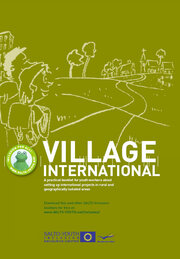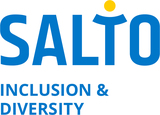Overcoming linguistic barriers in international youth activities?
Communication in a foreign language - not knowing a foreign language?
Young people in rural areas do not have as much contact with foreign languages as their peers in urban settings. The opportunities for language learning are rather scarce in smaller places, as well as the opportunities to practise them. This often means their language skills are not as good, and this makes them reluctant to participate in international activities. So how can you get them on an international project anyway?
Avoiding the foreign language?
- If you are organising your first international youth exchange and your group of young people is afraid of the language barrier, search for partners whose language is the same (e.g. German speakers in Austria, Germany, Switzerland or French speakers in France and Belgium) or similar to your own (Slovenian, Czech, Slovakian language or mix Italian, French and Spanish speakers).
- There's nothing to prevent you doing an international youth activity in which the working language is your own language. There might be foreign groups that speak your language (e.g. children of emigrants from your country?).
- Or you get interpreters in. This avoids anybody having to speak the language of the other group(s), but it considerably limits the chances of spontaneous interaction.
- And don't underestimate the power of non-verbal communication. You don't always have to 'talk': you can also use pictures, music, sport, drawing,...
Brushing up on the foreign language
- But maybe your aim is precisely to get your young people more interested in speaking a foreign language. Start from what they know already: maybe fishing out their English course books from a box in the attic can help refresh their 'school-knowledge'.
- You can offer participants a language course prior to their participating in an international youth event, or give them publications or articles in the foreign language; that way, they will have more contact with the language.
- Organise activities where the young people are confronted with or use the foreign language: listen to music from that country, start writing letters to your partner groups, get a youth magazine from that country and see what you can understand...
- If you know a native speaker (au-pair, EVS, exchange student) in the community, you can organise an informal talk for your youth group once a week at the local café; this way they can try out the language before they actually go on the exchange.
- You can also learn English on the internet - there are many interactive courses, forums, simple chats, etc. around. Or you can- practise!!!
^^ top ^^
Step-by-step exposure
- It is important not to scare people away by proposing tough language courses and focusing too much on their language skills. Start with refreshing what they know already (often more than they think) and do some activities around the language you will be using (see above).
- Start off with an exchange where there are no native-speakers, so that all young people are on the same level - everybody is speaking a foreign language.
- Plan some time or activities during the exchange when they can 'take time off' from having to speak and think in a foreign language. This can be some exercises or discussions in national groups (in their native language), or activities where no language is needed (mime, sport, music,...).
- International activities can really motivate people to start learning a foreign language; you can help your young people to find language courses or conversation classes after your activity.
Creating the confidence to speak
- Often the basic words are there, but not the courage to speak. Therefore it is important to create an atmosphere where people feel secure enough to speak.
- Set a good example and make mistakes yourself. This way you set the tone and people feel more comfortable about not speaking the language perfectly either. Tell participants that language is only a tool and that it doesn't have to be perfect. Try and prevent people laughing at others because of language mistakes. Be patient with people who need more time to find their words.
- Work a lot in smaller groups. It is easier to dare to make mistakes in front of a few people than in a big group. The more people know each other (use lots of group dynamic exercises), the more they will try to communicate with each other.
- Give the young people some (backup) tools that they can use during the exchange: a little dictionary with basic words and phrases. You could even develop this together with the young people (asking them what expressions they would be likely to need). Or you can (continue to) build this dictionary during the exchange.
- Have a back-up system if someone really doesn't feel comfortable speaking the foreign language e.g. team up a participant with good language skills and one with poorer language skills, so that one can help the other and translate if needed.
TIP
Some National Agencies organise courses that focus on the confidence to speak English (e.g. French-speaking Belgian NA and French NA). More info in the European Training Calendar www.SALTO-YOUTH.net/training/.
^^ top ^^
Communication goes both ways
- Groups in an international project who are lucky enough that the working language is their mother tongue, should also make an effort. Often they have difficulties communicating as well, because they speak the language too fast or they use too much dialect or use words which are too difficult. You should make the native speakers aware that they should also make an effort to adapt their language so that the non-native speakers can understand.
- Have regular evaluation meetings with your participants to see how it is going, and keep an eye out for potential communication difficulties.
The power of non-verbal communication
- In your international project you can choose methods which involve all senses (smelling, touching, listening, seeing) and not only talking. Give priority to interactive and creative methods e.g. collage, drawing, mime, games,...
- You can do a workshop on body language and encourage participants to use non-verbal communication.
- Non-verbal communication takes more time, so allow for this during your programme.
HOW WE COMMUNICATE
50% = body language (Eye contact, Gestures, Posture),
40% = para-language (volume, pitch/tone/speed, enthusiasm,
10% = language content (what is actually said - what people hear;
So we should manage to communicate after all - also without proficiency in a foreign language - what do you think?
- If you are interested in communication on international projects, have a look at 'Going International - Opportunities for ALL' (pages 44-47) www.SALTO-YOUTH.net/GoingInternational/
- Also have a look at the T-Kit on Methodology in Language Learning at www.youth-partnership.net or www.SALTO-YOUTH.net/Toolbox/
Do you have any tips for overcoming language barriers? What worked for you? Add your contributions below (log in with your SALTO username or create one to add comments)
^^ top ^^
 www.salto-youth.net/
www.salto-youth.net/
VillageInternational/

 Protected from exclusion
Protected from exclusion
Downloads
The following downloads are available:
- Village International - setting up international projects with rural youth - 2007
A step by step manual through the different stages of setting up a youth project in your rural or geographically isolated area. With lots of practical tips and tricks. Based on SALTO TC Rural 2007. (Rightclick & download to your PC)
